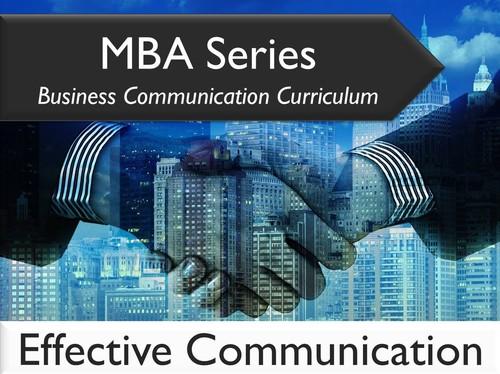Oreilly - MBA Series Business Communication Curriculum: Effective Communication
by Ni'am Muhammad | Publisher: Technics Publications | Release Date: September 2019 | ISBN: 9781634625869
Follow along with communications expert Ni'am Muhammad and learn how to communicate effectively in the workplace. Sharpen your communication skills in meetings and in one-on-one sessions – through both verbal and written mediums. Know how to get your message across, gain trust, influence others, and engage in active listening. Learn how to communicate effectively across genders, cultures, and generations, and how to confidently tackle difficult conversations. The MBA Series contains three curriculums: Business Management, Business Development, and Business Communication. This course, Effective Communication, is a core course within the Business Communication curriculum. Follow this link to take all of the courses in the MBA Series here on O'Reilly. This Effective Communication course contains 14 topics: Effective Communication: Introduction. This first topic in the effective communication course introduces you to this video series and what to expect from each training module. Communication Styles Overview. This second topic in the effective communication course defines communication and explains the various communication styles including Passive Communication, Aggressive Communication, Passive-Aggressive Communication, and Assertive Communication. Exercises will be used to reinforce key concepts. Verbal Communication. This third topic in the effective communication course delves into the core components of verbal communication, and reveals how to use verbal communication effectively. The most crucial verbal communication skills feature: effective speaking (diction), listening (active listening/ enunciation), reinforcement (using encouraging words), questioning (closed vs. open), reflecting (paraphrasing), clarifying, and summarizing (which includes both parties). Exercises will be used to reinforce key concepts. Nonverbal Communication. This fourth topic in the effective communication course defines nonverbal communication, and explains why nonverbal communication is so powerful. Nonverbal communication describes characteristics of speech, as well as its accompanying behavior, that convey meaning. Examples include proximity to the listener, physical appearances (which closely alludes to the dress code), gestures and facial expressions, pitch, talking speed, body posture, and stance. Exercises will be used to reinforce key concepts. Written Communication. This fifth topic in the effective communication course explains how to maximize the value from written communication, and shares tips for ensuring your written communication comes across effectively. Written communication is by far the most important and effective version of business communication. Exercises will be used to reinforce key concepts. Conversational Skills Development. This sixth topic in the effective communication course explains the importance of good conversational skills, and the high value of active listening. We also share how to be an engaging speaker. Exercises will be used to reinforce key concepts. Group Communication. This seventh topic in the effective communication course shares the basics of group dynamics and reveals how to be effective in groups. The three main factors affecting a team's cohesion (working together well) are: environmental, personal and leadership. The five key elements of group dynamics (as elucidated upon by psychologist Dr. Bruce W. Tuckman) are: forming, storming, norming, performing, and adjourning. Exercises will be used to reinforce key concepts. Communications Technology. This eighth topic in the effective communication course explains how modern technologies impact communication. Both benefits and drawbacks of communicating through technology are shared. The four main communication technologies include the internet, email, telephone, and television. Exercises will be used to reinforce key concepts. Obstacles to Effective Communication. This ninth topic in the effective communication course covers several potential obstacles to effective communication, including physical impairments, outside impediments, and personality conflicts. Exercises will be used to reinforce key concepts. Cultural Implications of Communication. This tenth topic in the effective communication course defines culture and provides techniques for working in a global community. Culture influences management, decisions and all business functions from accounting to production. Exercises will be used to reinforce key concepts. Conflicts and Disagreements. This 11th topic in the effective communication course explains when conflict is necessary, how to avoid conflict, and how to foster healthy conflict. Master the five-step process to conflict resolution. Exercises will be used to reinforce key concepts. Negotiation Essentials. This 12th topic in the effective communication course explains the basics of negotiation. Learn the six steps for negotiation success. Exercises will be used to reinforce key concepts. Constructive Criticism. This 13th topic in the effective communication course covers the critic-recipient relationship, discusses personal criticism, and explains how to offer criticism. Constructive criticism in the workplace can help employees understand what they are doing well and what they need help with. Benefits include professional development, clarified expectations, stronger working relationships and overall organizational growth. Exercises will be used to reinforce key concepts. Effective Communication: Conclusion. This 14th topic in the effective communication course summarizes the key concepts in this course.
- Effective Communication: Introduction 00:06:36
- Communication Styles Overview 00:26:01
- Verbal Communication 00:15:08
- Nonverbal Communication 00:22:12
- Written Communication 00:15:51
- Conversational Skills Development 00:11:47
- Group Communication 00:12:39
- Communications Technology 00:13:57
- Obstacles to Effective Communication 00:15:36
- Cultural Implications of Communication 00:06:42
- Conflicts and Disagreements 00:12:51
- Negotiation Essentials 00:15:25
- Constructive Criticism 00:14:17
- Effective Communication: Conclusion 00:05:17




